Our research allows us to better understand our clients and meet their needs
We have been evaluating the benefits of our treatment for decades and have previously published the only peer-reviewed decade-long post-graduate outcome study on residential eating disorder clients. Our current research is an extension of our twenty-seven year commitment to providing research-backed care.

6,000+
Clients Currently Enrolled in the Study
High Response Rate*
0%
at Admission
0%
at Discharge
Based on consent rates
High response rate indicates data truly reflects our client population
Weight Restored by Discharge from Residential
0%
of Adolescents


0%
of Adults
Among clients diagnosed with Anorexia Nervosa
Our clients maintain treatment gains 6-months post-discharge
They get well and stay well
We are the first treatment provider to show lasting improvement
Reduced ED Symptoms
Reduced Depression Symptoms
Reduced Anxiety Symptoms
0%
of adults admitted to residential eating disorder treatment meet criteria for posttraumatic stress disorder (PTSD)
In response to high rates of trauma, we developed an integrated trauma treatment program. We are the first to provide evidence-based trauma treatment (CPT) concurrently with eating disorder treatment in higher levels of care

Past research studying trauma.
We are proud to be the first eating disorder treatment company to publish data on trauma and eating disorders. Below are links to additional research.
The association of traumatic events and posttraumatic stress disorder with greater eating disorder and comorbid symptom severity in residential eating disorder treatment centers
- 49.3% of a sample of 642 adults diagnosed with eating disorders and admitted to residential treatment met criteria for PTSD.
- These patients demonstrated more severe symptoms across multiple domains of mental health, including eating disorder symptoms, anxiety and depression, and reported poorer quality of life than patients diagnosed with eating disorders, but not PTSD.
Eating disorder onset during childhood is associated with higher trauma dose, provisional PTSD, and severity of illness in residential treatment
- The age of eating disorder onset was examined in a sample of 1,283 adults admitting to residential eating disorder treatment.
- In general, earlier eating disorder onset was associated with poorer outcomes. Patients who reported an onset of their illness during childhood or adolescence demonstrated higher rates and doses of traumatic life events, higher current PTSD prevalence, higher BMIs, increased severity of their eating disorder, depression and state-trait anxiety symptoms; worse quality of life, and, more prior inpatient and residential admissions for ED treatment.
Headache, eating disorders, PTSD, and comorbidity: implications for assessment and treatment
- 39% of a sample of 1,461 adult eating disorder patients in residential eating disorder treatment endorsed frequent headaches (“often” or “always”) occurring.
- These patients with headaches and eating disorders had significantly higher rates of PTSD (64%) and higher scores on all measures, including eating disorder symptoms, major depression, anxiety disorders and quality of life.
Provisional posttraumatic stress disorder is associated with greater severity of eating disorder and comorbid symptoms in adolescents treated in residential care
- 35.4% of a sample of 647 adolescent patients admitted to residential eating disorder treatment met criteria for PTSD.
- These patients demonstrated significantly higher scores on all measures, including eating disorder symptoms, major depression, anxiety disorders and quality of life, as well as significantly higher rates of all forms of childhood trauma. Additionally, adolescent patients with PTSD exhibited a significantly higher percent median body mass index for age and sex and a lower propensity toward anorexia nervosa, restricting type.
Sexual and gender minority individuals report higher rates of lifetime traumas and current PTSD than cisgender heterosexual individuals admitted to residential eating disorder treatment
- Nearly 24% of a sample of 542 adults admitting to residential eating disorder treatment identified as LGBTQ+.
- These patients presented with significantly higher rates of high impact lifetime traumas and frequency of PTSD diagnoses, as well as greater eating disorder and comorbid symptom severity, when compared to non-LGBTQ+ individuals.
- These findings underscore the need for the development and implementation of interventions targeting the treatment needs of this underserved population.
To request full-text copies of the above papers, please click here.
Staff Co-Authors
The following people co-authored the latest research as well as much of our past research, and we’re honored that they are part of our Monte Nido & Affiliates family.














